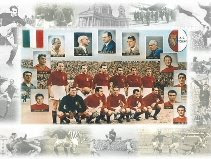 At 5.05pm it will be exactly 60 years since the Superga disaster, the plane crash which wiped out the all-conquering Torino team of the 1940s.
At 5.05pm it will be exactly 60 years since the Superga disaster, the plane crash which wiped out the all-conquering Torino team of the 1940s.The team won an unprecedented league and cup double in 1943 and, when league football resumed after World War II, won the title in 1946, 1947, 1948 and 1949 - four seasons in which the team were undefeated at their former Stadio Filadelfia home.
By the 1947-48 season the side - nicknamed 'Il Grande Torino' - had become unplayable, scoring 125 goals, conceding only 33, and winning the league by a margin of 16 points.
In those post-war years, Torino regularly supplied nine or 10 players to the Italian national team. It would be many years before European clubs played each other on a competitive basis but the pre-eminence of Torino meant that they were in demand for friendly matches around the continent.
In May 1949, Torino were closing in on a fifth league title but had agreed to play a testimonial match in Lisbon for the Benfica captain, Jose Ferreira.
In stormy conditions, the plane bringing the team home crashed into the hillside at Superga, just outside Turin, killing all 31 passengers, including the 18 members of the first-team squad and two coaches.
Italy was plunged into gloom and more than 500,000 people lined the streets on the day of the funerals. Journalist Renato Tavella has written of a country where "people tried to pretend nothing had happened and to carry on. But it was not easy. There was not a person in Italy that was not devastated by the terrible event."
Superga is often compared to the Munich air disaster of 1958 in which eight Manchester United players died. There are obvious similarities but the impact of Superga on the Italian psyche was arguably more profound. To understand why, it is necessary to place the event in its historical context.
The rise of Il Grande Torino took place as Italy was emerging from the war. It was a country battered by the Allied invasion, torn in two by the civil war between the Partisans and Fascists and deeply ashamed of its allegiance to the Nazis. It was not a good time to be Italian but the exploits of a team gave Italians something to feel proud of.
After the tragedy, the league awarded Torino the Serie A title and the club's youth team played the final four matches of the season. A decade later the club were relegated and despite the brief promise offered by a title win in 1976, captained by Renato Zaccarelli, have never returned to the elite of Italian football. Along with the 1976 title, all the fans have had to cheer are three Coppa Italia wins in 1968, 1971 and 1993.
"When I started with Torino in the youth team we trained in Grande Torino's stadium and we heard the stories of the great team that fell in 1949," Zaccarelli recalled. "That was 14 or 15 years afterward so the memories were still fresh."
The current Toro team are currently in an all-too-familiar position, struggling to avoid relegation. The team sit fourth from bottom of Serie A, one point above the drop zone with only five games remaining.
"I hope they can save themselves from relegation because I think on the 60th anniversary of the Superga tragedy it would be a real shame if they get relegated," Zaccarelli said.
The club have opted to keep the 60th anniversary of the tragedy fairly low key. Before Sunday's match against Fiorentina a minute's silence will be observed and on Monday at 5pm a memorial mass will be celebrated, as it is every year, at the Basilica of Superga.
[Il Grande Torino]
Source: Independent / AP

No comments:
Post a Comment